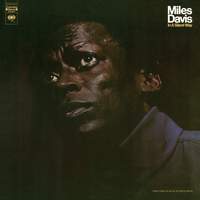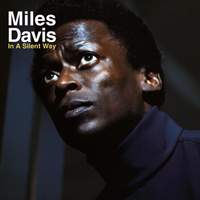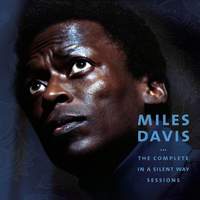Classic Recordings,
Miles Davis - In a Silent Way
 It probably goes without saying that Miles Davis was at the forefront of many major developments in jazz for much of his career. This week’s classic record is his first foray into jazz fusion, incorporating elements of modal jazz and proto-ambient music, In a Silent Way.
It probably goes without saying that Miles Davis was at the forefront of many major developments in jazz for much of his career. This week’s classic record is his first foray into jazz fusion, incorporating elements of modal jazz and proto-ambient music, In a Silent Way.
Miles had already been experimenting with an electric band line-up on-stage, but In a Silent Way ultimately cemented this jazz fusion style he’d continue until the mid-70s, historically referred to as his ‘Electric Period’. Embracing the sounds of John McLaughlin’s electric guitar, as well as an all-star trio of keyboardists with Chick Corea, Herbie Hancock and Joe Zawinul all contributing to the sessions, the record doubles down on Miles’s experiments in combining rock sensibilities with jazz, with new electric textures and a more steady backbeat to the rhythm section. Also returning from his Second Great Quintet were drummer Tony Williams and saxophonist Wayne Shorter, the latter playing soprano this time around. Adding to this was a relative newcomer to the ensemble, British bassist Dave Holland, who first appeared on the Filles de Kilimanjaro sessions the year before, a record seen in hindsight as a transitional period predicting many of the more ‘electric’ aspects of In a Silent Way.
Side A, Shhh / Peaceful, opens with an energetic hi-hat shuffle, subdued keyboard chords laying the bedrock for a sparse trumpet solo from Miles himself, the latter half of the tune opening up with McLaughlin and Shorter taking solos of their own. ‘In a Silent Way / It’s About That Time’ comprises side B, opening with an ethereal solo guitar opening by McLaughlin; written by Zawinul while playing in Cannonball Adderley’s band (with Adderley himself coining the title), Miles ultimately convinced Zawinul to contribute the composition to his record. As much as the piece forms such a crucial part of the record, I can’t help but wonder what an Adderley version would’ve sounded like - although Zawinul did eventually include a version of this on his self-titled record Zawinul in 1970, which is well worth a listen too. The middle section ‘It’s About That Time’ returns to a cool pseudo-modal territory, before slowing down further as the mellow electric guitar intro returns to close out the record.
Part of the novelty of In a Silent Way is the production of the record itself. Miles worked closely on this record with producer Teo Macero, who would later produce 1970’s seminal Bitches Brew, as well as 1971’s (A Tribute to) Jack Johnson. Inspired by classical sonata form, Macero used novel editing techniques to bookend each side with identical recordings of the same tune, giving both sides of the record an exposition, development and recapitulation; not so dissimilar of course to a traditional jazz structure of head, solo section, and head out. More than just being a cool studio trick, the extended structure of both sides gives the record an almost progressive feeling, even though the takes are identical. The unedited takes would later appear on the archival release The Complete in a Silent Way Sessions, alongside scrapped tunes like Zawinul’s ‘Early Minor’ and the 26-minute ‘Ghetto Walk’. What remained from the sessions was some of the most decidedly moody and understated work Miles and Co. had produced, tunes that emphasise space and ambience.
With an initially polarising reception, In a Silent Way’s decidedly un-jazz-like nature felt like a stab in the back to contemporary critics in the face of the genre’s fading relevance. In hindsight, of course, In a Silent Way has eventually solidified itself in the jazz canon, despite existing in a limbo between genres. The novel use of electric instrumentation, and the attention paid to texture and atmosphere long before the codification of ambient music, makes it an intriguing listen even to this day, and a personal favourite from the Davis catalogue.
Available Formats: CD, MP3, FLAC, Hi-Res FLAC, Hi-Res FLAC, Hi-Res+ FLAC
Available Formats: MP3, FLAC





